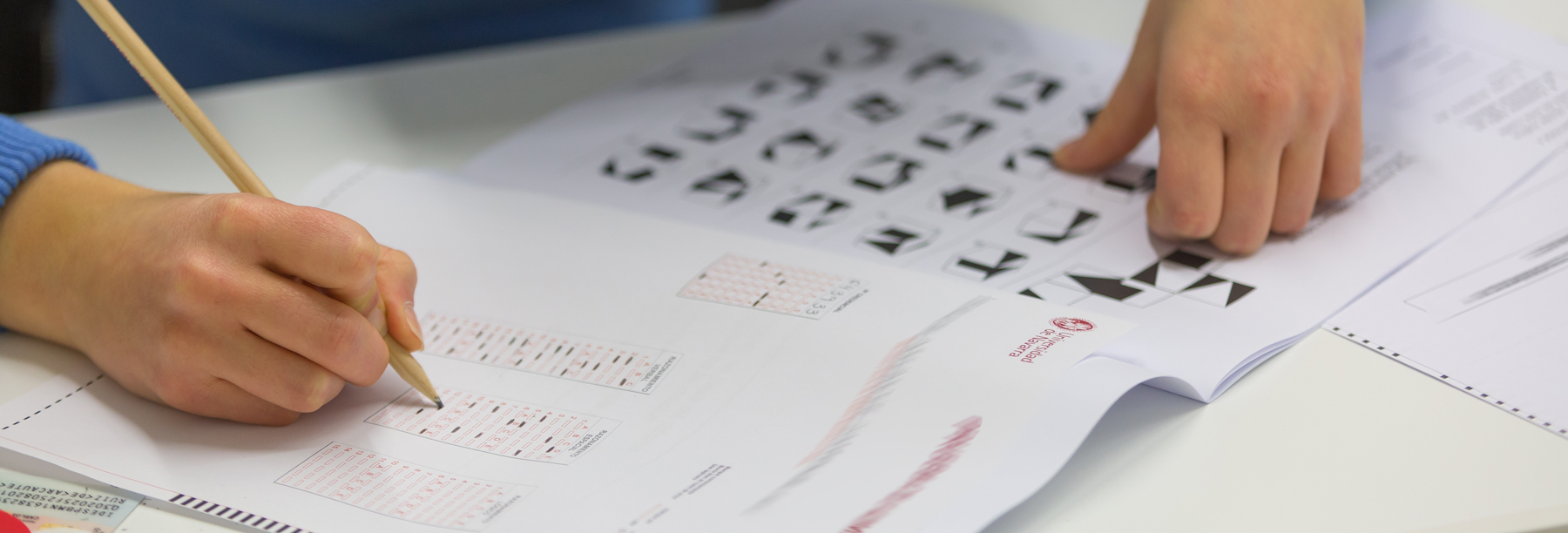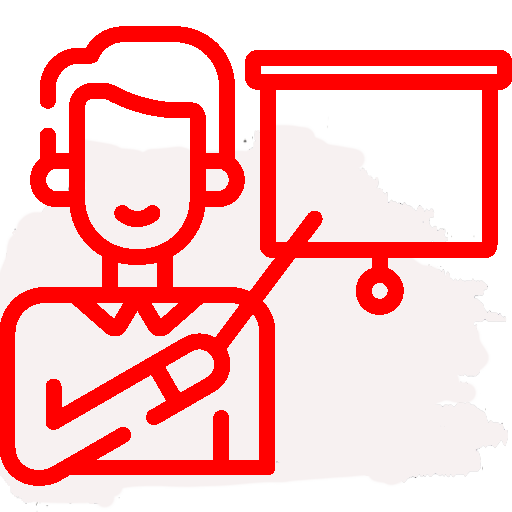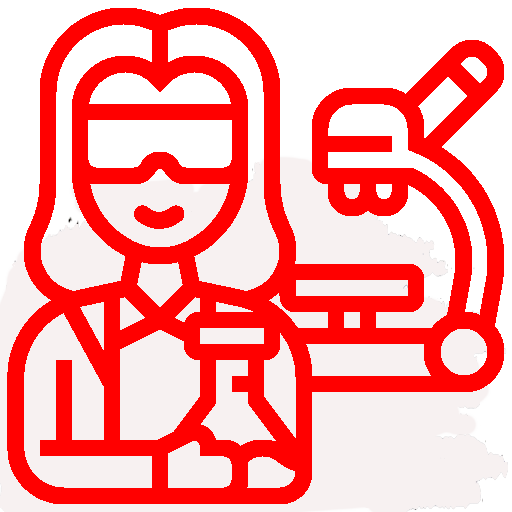Docimoteca

The School has an extensive collection of psychological and educational tests, as well as some psychological and pedagogical intervention programmes including non-book material.
It has the main psychological and psychoeducational application tests. The regime of use is by means of loandirectly to the School'sfaculty . The student body may make use of the fund with prior authorization, which implies the responsibility of the material and the tutoring of a professor.
Teachers or researchers from other Schools who are health professionals in psychology and psychiatry may make use of the same, in the same regime as the faculty of the School (by means of a loan of maximum 7 days of duration).
Permits
As the material is subject to deontological restrictions, only psychologists, speech therapists, pedagogues and psycho-pedagogues may administer it (see article 19 of the Psychologist's Code of Ethics).
article 19º All subject of strictly psychological material, both for assessment and for intervention or treatment, is reserved for the use of the Psychologists, who shall refrain from providing them to other non-competent persons. The psychologists shall manage or, where appropriate, guarantee the due custody of the psychological documents.
Traditionally, the administration and assessment of tests is reserved for psychologists, and most national and international legislation concerning the practice of psychology provides for it in this way, although there is a classification aimed at regulating this:
TEACHERS

Teachers can reserve the material for teaching through the following e-mail address sec_edu_psico@unav.es informing of the desired dates, the subject and signing a letter of use manager that will be attached to the mail and will be available to download on the web - the signed form attachment will be your application of reservation. At no time will they be able to withdraw the material from campus UNAV, except in extraordinary cases (these cases will be studied individually). In these cases the letter of application extraordinary In these cases, the extraordinary letter will be filled out detailing the reasons for the use of the material outside of campus and a letter of responsibility will be signed.
RESEARCHERS

Teachers will be able to reserve the material for their teaching through the mail sec_educa_psico@unav.es informing of the desired dates, the subject and signing a letter of use manager that will be attached to the mail and will be available to download on the website - the signed form attachment will be your application of reservation. At no time will they be able to withdraw the material from campus UNAV, except in extraordinary cases (these cases will be studied individually). In these cases, the extraordinary application letter will be filled in, detailing the reasons for the use of the material outside campus and a signed letter of responsibility.
STUDENTS

Students may reserve the tests for their study by sending an email to sec_educa_psico@unav.es enclosing the letter of authorisation signed by their teacher. They will have to present their card UNAV in order to access the reserved material and will only be able to consult the material in the simulation centre. They will not be able to collect the material from the simulation centre. For level B and C tests, the study or enquiry must be carried out in the presence of your teacher or an authorised person.
reservation of the tests
For more information on test reservation , please write to sec_educa_psico@unav.es or call 948 425 690 x .
The tests will be collected at the Office of the Dean of the School, located in the Ismael Sanchez Bella Building, Campus University.
AVAILABILITY
|
profile of the user |
Thematic |
Name |
Acronym |
|
(C) |
development Infantile,Psychomotricity,School |
Bailey scales from development for children. |
BAILEY-III |
|
(C) |
Neuropsychology |
Wisconsin Card Sorting Test |
WCST |
|
(C) |
Neuropsychology |
WMS-IV, report Weschler Scale-IV |
WMS-IV |
|
(B) |
Neuropsychology |
Brief test for the assessment of cognitive status |
BCSE |
|
(C) |
Intelligence |
WAIS-IV Wechsler Adult Intelligence Scale IV |
WAIS-IV |
|
(C) |
Skills,School |
topic-3 Test of skill Basic Mathematics |
TOPIC - 3 |
|
(B) |
Intelligence |
MSCEIT Mayer-Salovey-Caruso Emotional Intelligence Test |
MSCEIT |
| (B) |
Neuropsychology |
ENFEN assessment Neuropsychological Assessment of Executive Functions in Children |
ENFEN |
|
(B) |
Symptomatology and specific disorders |
ADI-R Autism Diagnostic Interview - R |
ADI-R |
|
(C) |
Intelligence,School |
Wechsler Adult Intelligence Scale WAIS |
WAIS |
|
(C) |
Intelligence,School |
WISC Wechsler Intelligence Scale for Children |
WISC |
|
(C) |
Intelligence,School |
WISC-R Wechsler Intelligence Scale for Children-Revised |
WISC-R |
|
(C) |
Intelligence,School |
WPPSI-IVEWechsler Preschool and Primary School Scale of Intelligence |
WPPSI-IV |
|
(C) |
Intelligence,School |
K-BIT Kaufman Brief Intelligence Test |
K-BIT |
|
(C) |
Personality |
MMPI questionnaire of Personality MMPI |
MMPI |
|
(C) |
Personality |
MMPI-A Minnesota Multiphasic Personality Inventory for Adolescents |
MMPI-2 |
|
(C) |
Personality |
16 PF questionnaire of Personality 16PF |
16 PF-5 |
|
(C) |
Personality |
16 FP questionnaire of Personality 16PF-Adolescents |
16 PF-APQ |
|
(B) |
Aptitudes,Intelligence,School |
BADYG Differential and General Aptitude Battery |
BADYG |
|
(B) |
Aptitudes,Intelligence,School |
BADYG-E3 Differential and General Aptitude Battery |
BADYG-E3 |
|
(B) |
Aptitudes,Intelligence,School |
BADYG-S Differential and General Aptitude Battery |
BADYG-S |
|
(C) |
Personality |
NEO PI-R NEO Personality Inventory . NEO-FFI Reduced NEO Five-Factor Inventory |
NEO PI-R |
|
(C) |
Intelligence |
WISC- V Wechsler Intelligence Scale for Children |
WISC-V |
|
(C) |
Intelligence |
WISC- IV Wechsler Intelligence Scale for Children |
WISC-IV |
|
(C) |
Intelligence |
WISC- R Wechsler Intelligence Scale for Children |
WISC-R |
|
(B) |
Neuropsychology |
assessment child-specific and child-tailored cognitive domains assessed through the analysis of 6 cognitive domains |
NEPSY II |
|
(C) |
Neuropsychology |
PORTEUS Maze Test |
TLP |
|
(C) |
|
DSM-5. guide diagnosis and statistics of mental disorders |
DSM-5 |
|
(B) |
development Infantile,Psychomotricity,School |
MSCA. McCarthy Scales of Abilities and Psychomotor Skills for Children - guide + booklets |
MSCA |
|
(B) |
B |
ESFA. Family Satisfaction Scale by Adjectives |
ESFA |
|
(A) |
development Children's |
CSAT-R. Sustained Care Task in Childhood - Revised |
CSAT-R |
|
(A) |
A |
RINGS. Test for the assessment of Executive Functions. Based on the Tower of Hanoi |
RINGS |
|
(B) |
Intelligence |
MATRICES. General Intelligence Test. |
MATRICES |
|
(A) |
development Infantile,Psychomotricity,School |
PY-BL-R. development Early Childhood Psychomotor Scale BRUNET-LEZINE |
PY-BL-R |
|
(C) |
|
CSM questionnaire de Salud Mental |
CSM |
|
(B) |
B |
Test of copying a complex figure.Rey, |
King figure |
|
(A) |
A |
CELF-IV Spanish. Clinical evaluation of Language Fundamentals |
CELF-IV |
|
(B) |
B |
BRIEF-P. assessment Behavioural Executive Function - Children's Version |
BRIEF-P |
|
(A) |
A |
CCC-2 Children's Communication Checklist (English) |
CCC-2 |
|
(A) |
A |
IDC. MACARTHUR. Inventory of development Communicative |
CDI |
|
(B) |
B |
PFCT-C. Personalized Fluency Control Therapy for Children (Cooper) |
PFCT-C |
|
(A) |
A |
PLS-IV. Preschool Language Scale |
PLS-IV |
|
(A) |
A |
Basic Concepts Tests. Boehm, A. (1996) |
BOEHM |
|
(A) |
A |
ITPA Illinois Test of Psycholinguistic Aptitude. Kirk, SA., McCarthy, JJ. and Kirk, WD. (1989 y 2009) |
ITPA |
|
(B) |
|
CESQT - questionnaire for the assessment of Burnout Syndrome work |
CESQT |
|
(A) |
|
MABC 2 COMPLETE SET |
MABC 2 |
|
(A) |
|
SEA Programme: development social, emotional and mindfulness skills for young people |
SEA |
|
|
|
EVHACOSP (EXCLUDED FROM LOAN) |
EVHACOSP |
|
|
|
ADCAS (EXCLUDED FROM LOAN) |
ADCAS |
|
(B) |
|
List of Adjectives for the assessment Self-Concept |
LAEA |
|
(B) |
|
BOT-2, Bruininks-Oseretsky Test of Motor Proficiency-2 |
BOT AND BOT 2 |
|
(B) |
|
General Intelligence Test 1&2 |
TIG 2 |
|
|
|
View information |
DARA |
|
(A) |
|
EXLPORA (TEST, correction kit and booklets) |
EXPLORE |
|
(B) |
|
test analytics for the assessment of learning difficulties in arithmetic calculation |
EVADAC |
|
(B) |
|
PROLEC-R. Batería de assessment de los Procesos Lectores - Revisada (b) |
PROLEC R |
|
(B) |
|
SENA. System of assessment of Children and Adolescents (b) |
SENA |
|
(C) |
|
MCMI-III, Millon's Multiaxial Clinical Millon Inventory-III |
MCMI III |
|
(B) |
|
EPQ-R. questionnaire Eysenck Personality Questionnaire - Revised (b) |
EPQ - R |
|
(B) |
|
assessment of competences |
Compe-TEA |
|
(B) |
|
questionnaire situational personality |
CPS |
|
(A) |
|
questionnaire of learning strategies |
CEA |
|
(C) |
|
Rorschach test |
RORSCHACH |
|
(B) |
|
PROLEXIA (Complete set and correction kit) |
PROLEXIA |
|
(B) |
|
Angry Animals. Complete Game |
ANIMALS |
|
|
|
Online proofreading - TEA proofreads (it is in CUN) |
TEACORRIGE |
|
(A) |
|
CEM- Growing in Mindfulness |
CEM-Mindfulness |
|
(A) |
|
Emociona-T Pack |
EMOCIONA-T |
|
(A) |
Adaptive behavior |
ABAS II |
ABAS - II |
|
(A) |
Intelligence |
WISC-V Complete Set - Briefcase |
WISC-V |
|
(A) |
Attention |
d2-R. Attention Test - Revised |
d2-R |
(A) Level I tests : they can be applied, corrected and administered by non-psychologists after due training by a psychologist (educators, educational psychologists, doctors, etc.), perhaps the most obvious exponent of Level I tests are the tests and examinations of assessment of knowledge and of selection and admission to educational institutions.
(B) Level II tests: they can be applied by non-psychologists but their correction and interpretation must be carried out by a psychologist, such as the drawings of the human figure, of the family that children make in their daily life at school.
(C) Level III tests: they are exclusively administered, corrected and interpreted by a trained psychologist, and are usually the most relevant and complex tests of their area as well as the most difficult to interpret and analyze.
